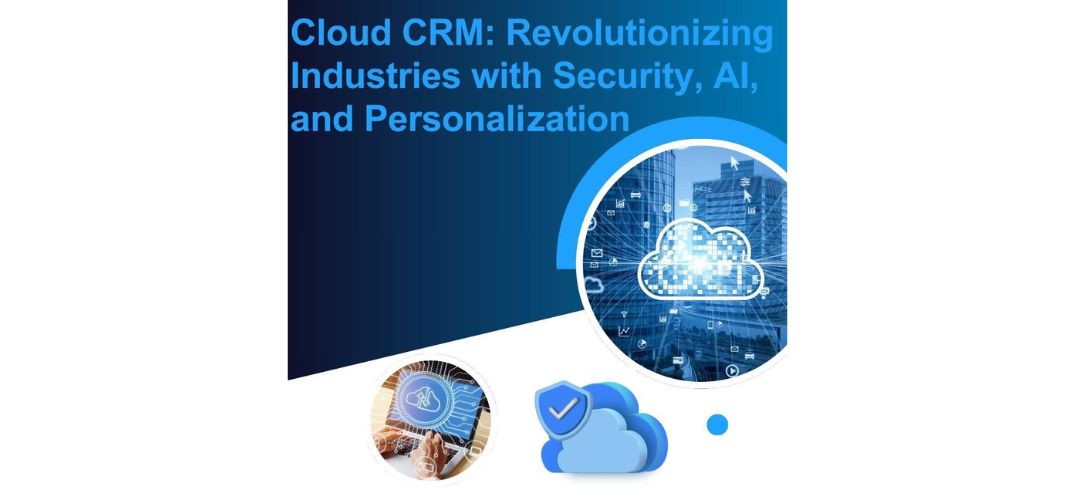In the modern business world, Customer Relationship Management (CRM) has evolved far beyond simple contact management. Cloud-based CRM systems, featuring enhanced security and cutting-edge technologies, are now transforming industries. Authored by Nagasruthi Kattula, the article delves into the role of Cloud CRM in revolutionizing sectors such as healthcare, retail, and agriculture, exploring how these industries leverage AI, cloud infrastructures, and IoT to drive innovation and efficiency.
The Rise of Cloud CRM: Beyond Traditional Management
Cloud CRM systems have transcended their traditional role of customer databases, evolving into comprehensive platforms with a transformative impact on industries. At the heart of this evolution are advanced security protocols and artificial intelligence (AI) that enable businesses to not only protect sensitive data but also gain deeper insights into customer behaviors. These systems now support personalized customer interactions, improved business decision-making, and heightened operational efficiency across various sectors.
Healthcare’s Technological Leap: Elevating Patient Care
In the healthcare industry, the integration of cloud CRM platforms has been nothing short of transformative. These platforms help manage patient relationships while maintaining compliance with regulations like HIPAA. The ability to store and access patient data securely, coupled with AI-powered insights, enhances patient care by facilitating more personalized and timely interventions. With cloud CRM, healthcare providers can streamline communication between departments, improve patient satisfaction, and reduce operational inefficiencies, setting a new standard for patient engagement and care delivery.
Retail’s Digital Shift: Personalized Shopping Experiences
Retailers are also embracing cloud CRM to create personalized shopping experiences for consumers. By leveraging AI to analyze customer data, retailers can craft highly targeted marketing campaigns that resonate with individual customers. This integration of AI not only boosts engagement rates but also improves sales performance. A shift towards multi-cloud architectures further strengthens security, ensuring that customer data is protected against increasingly sophisticated cyber threats. This approach enhances retailer resilience while optimizing the customer journey from browsing to post-purchase support.
Agriculture’s Innovation: IoT-Driven Efficiency
The agricultural industry, once thought of as a traditional sector, is now at the forefront of cloud CRM adoption. With the integration of Internet of Things (IoT) sensors and predictive analytics, farmers can make more informed decisions on resource management, crop planning, and weather adaptations. Cloud CRM systems, in conjunction with real-time data, help optimize crop yields while reducing waste and resource usage. This intelligent data collection improves both the sustainability and profitability of agricultural operations, allowing farmers to meet the demands of a changing global market.
Data Security: The Cornerstone of Cloud CRM Success
As organizations in healthcare, retail, and agriculture embrace cloud CRM, security has become a central focus. The increasing volume of sensitive data being handled across these sectors necessitates robust protection against cyber threats. Zero Trust architecture, AI-powered threat detection, and end-to-end encryption are now standard features in cloud CRM platforms. These innovations ensure that only authorized personnel can access critical data, while AI enhances the ability to detect and mitigate potential threats before they cause harm. This focus on security not only safeguards organizational data but also builds customer trust, which is essential for long-term business success.
Looking Ahead: The Future of Cloud CRM
As industries continue to navigate the digital transformation journey, the future of cloud CRM looks promising. Emerging technologies such as blockchain, augmented reality (AR), and advanced AI are expected to further redefine the CRM landscape. Blockchain, for instance, could streamline supply chain transparency, while AR could enhance customer engagement by offering virtual product trials. Meanwhile, advanced AI will enable CRM systems to anticipate customer needs with unprecedented accuracy, delivering personalized experiences on an entirely new level.
In conclusion, the ongoing evolution of cloud CRM systems signifies a shift from simple business tools to integral components of strategic business infrastructures. By integrating advanced technologies, these platforms are not only enhancing customer engagement but also driving industry-wide transformation. As sectors like healthcare, retail, and agriculture continue to innovate with cloud CRM, the technology will undoubtedly continue to shape the future of business operations. Nagasruthi Kattula’s analysis provides valuable insights into how these advancements will continue to push the boundaries of what CRM systems can achieve in an increasingly digital and interconnected world.

































